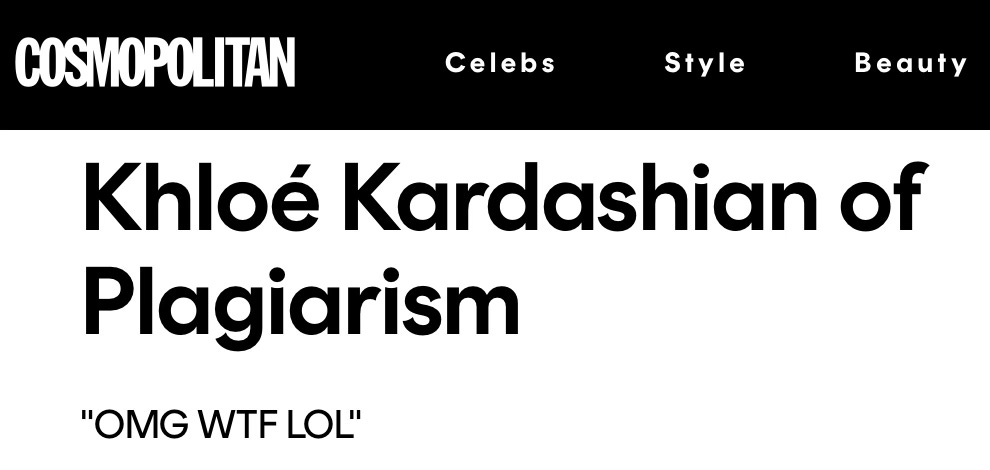The resignation of Harvard University president Claudine Gay came after it was discovered she was a serial plagiarist starting at least since her days as a student. It’s a sad day when anyone loses their jobs, but cheating in academia is usually a red line.
This has not always been the case. President Joe Biden was given a reprieve when he was caught plagiarizing pages of material when he was a student at Syracuse Law School. Purloining the works of others without credit is a trait that has plagued Biden his entire life.
The Washington Post and CNN are seemingly indifferent that star pundit, Fareed Zakaria, has been credibly accused by several people of being a serial plagiarist for years. One of the most famous plagiarism cases at the New York Times was when disgraced reporter Jayson Blair copied the work of others and presented it as his own.
BuzzFeed is an entertainment website known for sandwiching adolescent-focused memes and silly lists in an ocean of advertisements. It’s been compared to Gawker, a gossip website that declared bankruptcy and shut down in 2016. The comparison is apt as BuzzFeed has been slashing costs, closing offices, and laying off workers. It’s been delisted from the Nasdaq. Its shares are known as “penny stocks” because they’ve been trading under one dollar, which is just steps from financial oblivion.
On its website, BuzzFeed claims it is an “international news organization” that focuses on “breaking news quickly and accurately.” Its editor claimed it is “one of the largest news and entertainment sites on the web.” Apparently, the public does not think so highly of the gossip platform.
A 2014 Pew Research Center survey of several media outlets had bleak news for BuzzFeed. Not including talk radio and cable-TV pundit programs, BuzzFeed was the least trusted media outlet in America, with only 6 percent of respondents reporting they trusted the site. When radio and cable talk-shows were included, BuzzFeed was the only media outlet more “distrusted” than “trusted” by every single ideological group, from consistently liberal to consistently conservative.
One of BuzzFeed’s preoccupations when not accusing others of plagiarism is defending itself against allegations of plagiarism. Unfortunately for BuzzFeed, its plagiarism record is a dismal one. In April 2017, BuzzFeed alleged Supreme Court justice nominee Neil Gorsuch had plagiarized the work of another in his 2006 book, The Future of Assisted Suicide and Euthanasia. The article alleged two paragraphs that included seven endnotes in a 320-page book were plagiarized.
BuzzFeed claimed the work that was plagiarized was a 1984 Indiana Law Journal article titled “The Legislative Response to Infant Doe,” by Abigail Lawlis Kuzma. The alleged plagiarized author, Kuzma, disagreed with BuzzFeed, noting, “Given that these passages both describe the basic facts of the case, it would have been awkward and difficult for Judge Gorsuch to have used different language.”
Professor Emeritus John Finnis of Oxford University called the BuzzFeed claims nonsense. “In all the instances mentioned, Neil Gorsuch’s writing and citing was easily and well within the proper and accepted standards of scholarly research and writing in the field of study in which he and I work,” said Finnis, who supervised Gorsuch when he was a student at Oxford.
In 2016, BuzzFeed accused reality show personality Khloé Kardashian of plagiarism by “stealing her tweets.” Kardashian tweeted silly questions that had been tweeted by Yahoo! and other websites. One example was, “Do Siamese twins pay for one ticket or two tickets when they go to movies and concerts?” Such juvenile humor has been in circulation for decades. BuzzFeed was belittled for calling its gossip article an “investigation.”
Cosmopolitan magazine ridiculed the BuzzFeed article and pointed out that BuzzFeed routinely engaged in identical behavior. For example, BuzzFeed published an article titled “28 Times Yahoo Had Answers To All Your ‘Sexy’ Questions.” Less than two years after BuzzFeed’s Kardashian article, Fast Company magazine pointed out that BuzzFeed appeared to have plagiarized an original joke that appeared online only days earlier.
The big scandal for BuzzFeed erupted in 2014, when it was learned that, in dozens of instances, BuzzFeed had published content plagiarized from other sources. BuzzFeed issued a mea culpa of sorts, claiming that after it launched its “writers didn’t have journalistic backgrounds and weren’t held to traditional journalistic standards,” but it promised to do better.
That 2014 plagiarism admission was not an isolated incident. More than a half-dozen individuals and entities have come forward alleging BuzzFeed has used content created by others without attribution and, in some cases, compensation. In 2016 website Tech.Co listed six times BuzzFeed improperly used the content of others, including using copyrighted photos, plagiarizing a student’s short film, lifting articles from other websites, and copying YouTube videos.
A 2016 Change.org petition asked advertisers to stop advertising with BuzzFeed. The petition listed several examples of online content on BuzzFeed that appeared to be copied from others. Also in 2016, a Washington Post article listed several others who have claimed BuzzFeed stole their ideas, lifted their material, or copied their content without attribution or compensation. In 2018, a pair of Australian sisters who operate a YouTube channel alleged BuzzFeed was stealing their content.
As its precarious financial predicament suggests, a business model of publishing silly lists and memes and plagiarizing the work of others is not a sound business model.
Mark Hyman is an Emmy award-winning investigative journalist. Follow him on Twitter (X), Threads, Gettr, Post, and Mastodon.world at @markhyman, and on Truth Social at @markhyman81.
His books Washington Babylon: From George Washington to Donald Trump, Scandals That Rocked the Nation and Pardongate: How Bill and Hillary Clinton and their Brothers Profited from Pardons are on sale now (here and here).







